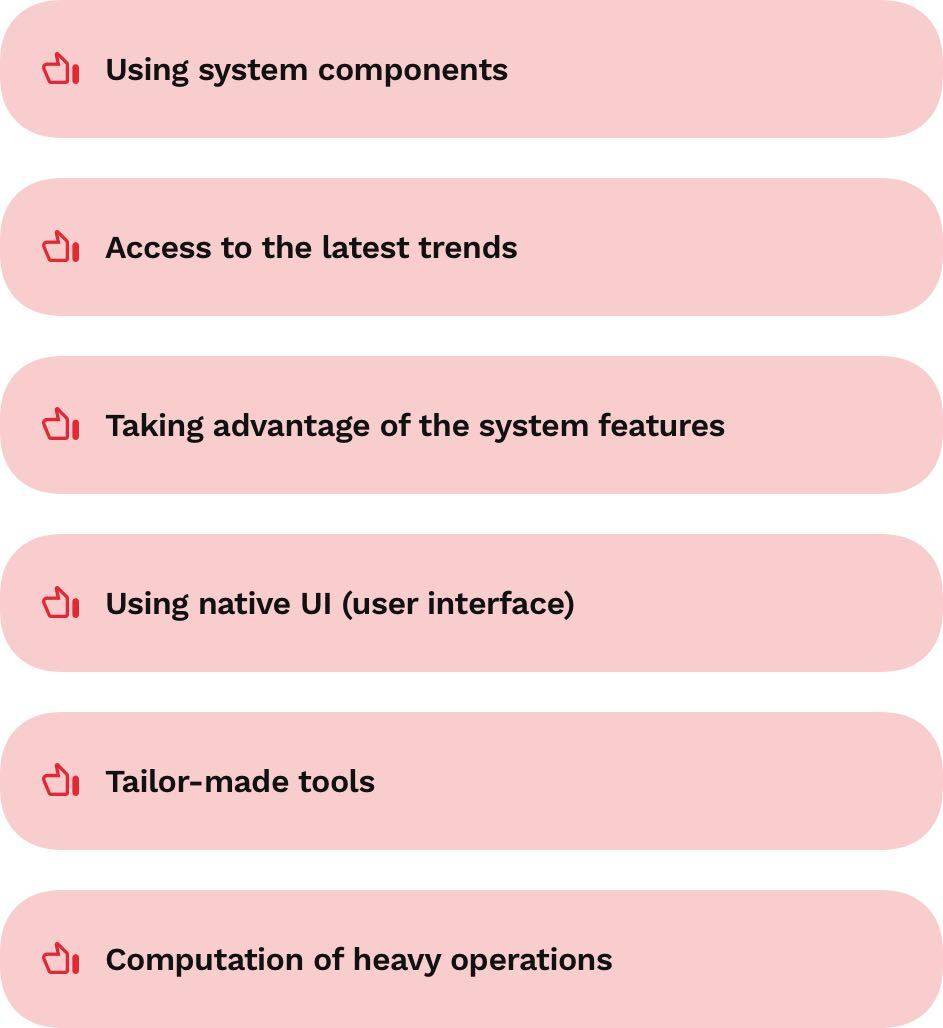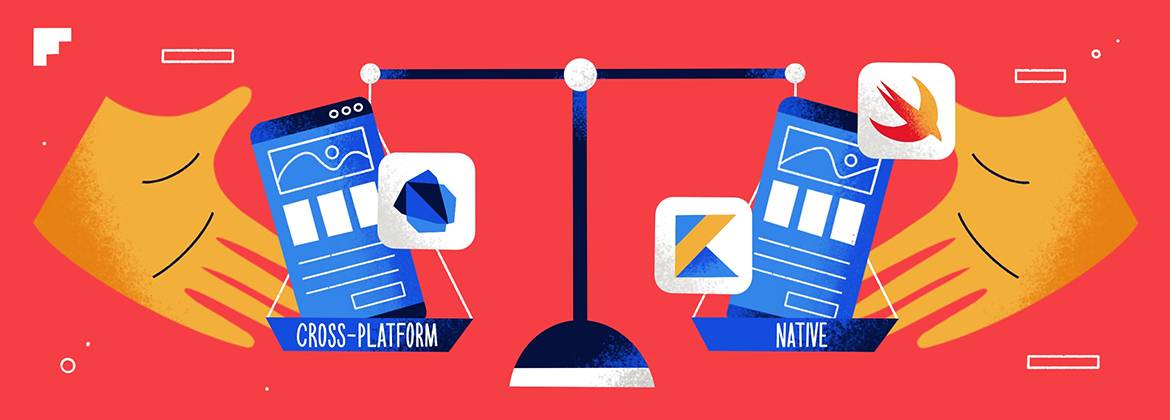
What is native app development?
Considering creating an app? You’ve probably already heard about different technologies, frameworks and programming languages used to build software, like native mobile apps, cross-platform development and web apps…
In this article we’ll dig into the topic of native app development and guide you through its advantages and disadvantages. You’ll also get the chance to explore other topics of mobile app development technologies.
Contents
Native mobile app development
In computing, native software is designed to run on a particular operating system. In contrast, cross-platform apps are intended to run on multiple operating systems and/or computer architectures.
A native app, in a nutshell, is a software program developed for use on a particular platform (such as Android and iOS) or on a particular device written in a language that is native to that platform.
Advantages of native apps
Here are some benefits of choosing native app development for your business and your app:
Taking advantage of the system features
A particularly important benefit of native apps is that they can take full advantage of the device features and latest system updates. Additionally, native apps have an extensive list of libraries that are made specifically for a given platform so that you can make the most of it. Native app development makes it possible to use the device’s internal features like camera, compass, storage, GPS, list of contacts and so on.
Using system components
Native app development means creating an app for users who already know their operating system very well and are used to its features. That’s why developers have the opportunity to build features with components that are similar across the whole system. Native user interface (UI) makes users familiar with particular elements in the app from the first use.
Access to the latest trends
New trends in features are always available for native apps. When choosing cross-platform development it’s also possible to implement native code and components in the app, but with native mobile app development, you can start implementing new features the minute a system update is released (or even in Beta!) so you can perform the latest trends in the app.
Tailor-made tools
Tailor-made libraries, components, patterns and others, created specifically for a given platform makes them perfectly matched with user expectations.

Disadvantages of native mobile app development
Separate apps for Android and iOS
If you strive to create an app serving Android and iOS users, you’ll have to create two separate native apps. A native mobile app will only work on one platform. In most cases, it’s better to create an app for both platforms so that all users can take advantage of its features.
Extended development time and costs
Because of multiple code bases for the creation of native mobile apps for different operating systems, developers might spend relatively more time on building them. It’s extremely hard for one developer to build two separate apps at the same time, so you’ll probably need at least two of them. That also means bigger costs.

Is native app development the right choice?
Knowing what are the advantages and disadvantages of native mobile app development, let’s finally determine for whom it could actually be a beneficial choice.
When you need an app tailored to the specific needs
Native apps are completely and comprehensively tailored for particular operating systems. This allows you to use all the features of your device, such as voice search, Google/Apple Pay, GPS navigation, system notifications. If you need the use of these in your app, it’s better to go with a native solution. Native apps can also take advantage of the latest system features. New things are available for cross-platform solutions later than in native apps.
When it comes to app design, as mentioned above, all native apps on a given platform have a similar interface and look very similar across the entire system. This makes it intuitive for users and they know how to navigate through these apps.
When you don’t want to meet any limitations
With native mobile app development, you also won't encounter as many limitations in functionalities as with other technologies, as native apps only need to be compatible with one platform. You don't have to worry about whether a feature will work any worse on another system.
When a fast release is not the priority
As you already know, native mobile app development can take more time than other solutions. If you have a fully-fledged project plan and fast release is not one of the most important things, it might be a good idea to choose native. It also applies to MVPs, of course.
When you plan to release the app for one platform
Sometimes your project plan, for example when you prepare a product roadmap, will show you that you don’t need to create an app for iOS and Android users but one platform will be enough. Of course, you can also create two identical native apps. The choice, whether you choose one of the platforms or both, might depend on different factors, such as:
Monetization strategy
The chosen monetization method has an impact on the choice of platforms your app needs to be built-in. On the other hand, the chosen platform can have an impact on the strategy. To give you an example, iOS users are more willing to pay for the app or subscriptions, as well as to make in-app purchases, than Android users.
The size of your target audience
Android is more popular than iOS globally. If you’re planning to create an app for one platform but available for a great number of users, it might be better to choose Android.
There are more Android users, but it doesn’t mean it concerns the whole world. It depends on the region too. For example, in the USA, iOS reached approximately 60% market share. As you can see, knowing your audience is very important.
Competitive advantage
There are more Android apps available on the market. In the first quarter of 2021 there were 3.48 million Android apps available in Google Play Store. iOS users could choose between 2.22 million available apps. This basically means that there’s a bigger competition on the Android apps market and it might be harder to stand out.
If you’d like to know more about the differences between Android and iOS and how to choose the right platform for your mobile app development, jump to this article.
Cross-platform app development
In summary, if you want to use specific hardware features, take advantage of the latest trends and can’t let anything limit you, you should choose native app development. But if you need to avoid high costs and a long-lasting project and don’t want to create a very complex solution, you should consider other options, such as cross-platform app development. It might also be a better choice if you decide to create an app for iOS and Android users.
Native mobile apps example
Let’s have a look at a mobile app created with Native technologies because of special requirements. This will give you an insight on why it’s sometimes necessary to choose native app development.
App enabling simple and secure documents signing
The Autenti platform and mobile apps enable electronic signing of documents in a simple and secure way. It's a solution for private individuals and for business clients. Through the platform, you can send and sign legally binding documents exclusively online, on any device with Internet access. You can use the platform to send documents to your clients, business partners or colleagues to obtain their e-signature.
In this project our team and our Partner together decided to create native apps as Autenti is a very complex solution and we’ve also taken over the creation of SDK to enable other platforms to integrate with Autenti. Its aim was to offer its users the possibility to sign their documents remotely as well as to view and save them offline, and archive. The SDK is meant to serve other teams and this means that others won’t have to create a new, very complex API to be able to use the e-signature and other useful features it offers. Other companies can simply integrate the ready-made SDK with the app and use most of the features provided by Autenti. Additionally, this app demanded the creation of custom libraries.
If you’d like to see more native apps, jump to this article, where we presented 10 native mobile apps examples.
Conclusion
Remember that the choice of technology always depends on the specific features of the app and there is no single best solution.
If you're considering building a mobile app/mobile apps and don't know which way to go, create a plan for the project first. Decide about the features of your app and the overall look, and you will be able to assess how complex the project will be. This basis will enable you to choose the appropriate technologies and determine whether you should go for native apps or something else.
If you’d like to see a comparison of native and cross-platform app development, jump to this article.






